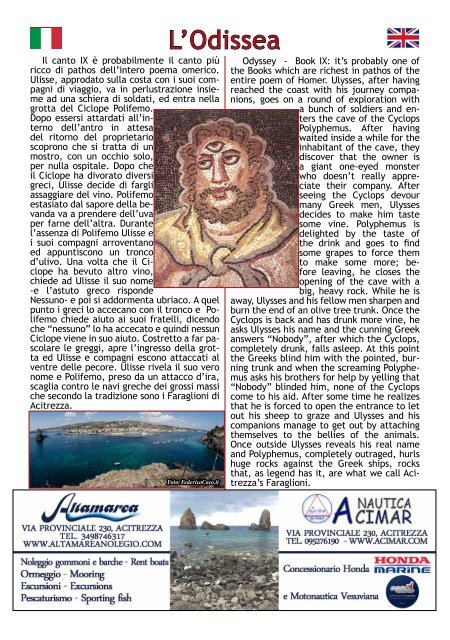Guida turistica Aci Trezza 2013 - Xiphonia Coop. a rl - Turismo ad ...
Guida turistica Aci Trezza 2013 - Xiphonia Coop. a rl - Turismo ad ...
Guida turistica Aci Trezza 2013 - Xiphonia Coop. a rl - Turismo ad ...
You also want an ePaper? Increase the reach of your titles
YUMPU automatically turns print PDFs into web optimized ePapers that Google loves.
Il canto IX è probabilmente il canto più<br />
ricco di pathos dell’intero poema omerico.<br />
Ulisse, approdato sulla costa con i suoi compagni<br />
di viaggio, va in pe<strong>rl</strong>ustrazione insieme<br />
<strong>ad</strong> una schiera di soldati, ed entra nella<br />
grotta del Ciclope Polifemo.<br />
Dopo essersi attardati all’interno<br />
dell’antro in attesa<br />
del ritorno del proprietario<br />
scoprono che si tratta di un<br />
mostro, con un occhio solo,<br />
per nulla ospitale. Dopo che<br />
il Ciclope ha divorato diversi<br />
greci, Ulisse decide di fargli<br />
assaggiare del vino. Polifemo<br />
estasiato dal sapore della bevanda<br />
va a prendere dell’uva<br />
per farne dell’altra. Durante<br />
l’assenza di Polifemo Ulisse e<br />
i suoi compagni arroventano<br />
ed appuntiscono un tronco<br />
d’ulivo. Una volta che il Ciclope<br />
ha bevuto altro vino,<br />
chiede <strong>ad</strong> Ulisse il suo nome<br />
-e l’astuto greco risponde<br />
Nessuno- e poi si <strong>ad</strong>dormenta ubriaco. A quel<br />
punto i greci lo accecano con il tronco e Polifemo<br />
chiede aiuto ai suoi fratelli, dicendo<br />
che “nessuno” lo ha accecato e quindi nessun<br />
Ciclope viene in suo aiuto. Costretto a far pascolare<br />
le greggi, apre l’ingresso della grotta<br />
ed Ulisse e compagni escono attaccati al<br />
ventre delle pecore. Ulisse rivela il suo vero<br />
nome e Polifemo, preso da un attacco d’ira,<br />
scaglia contro le navi greche dei grossi massi<br />
che secondo la tr<strong>ad</strong>izione sono i Faraglioni di<br />
<strong>Aci</strong>trezza.<br />
L’Odissea<br />
Foto: FedericoCoco.it<br />
Odyssey - Book IX: it’s probably one of<br />
the Books which are richest in pathos of the<br />
entire poem of Homer. Ulysses, after having<br />
reached the coast with his journey companions,<br />
goes on a round of exploration with<br />
a bunch of soldiers and enters<br />
the cave of the Cyclops<br />
Polyphemus. After having<br />
waited inside a while for the<br />
inhabitant of the cave, they<br />
discover that the owner is<br />
a giant one-eyed monster<br />
who doesn’t really appreciate<br />
their company. After<br />
seeing the Cyclops devour<br />
many Greek men, Ulysses<br />
decides to make him taste<br />
some vine. Polyphemus is<br />
delighted by the taste of<br />
the drink and goes to find<br />
some grapes to force them<br />
to make some more; before<br />
leaving, he closes the<br />
opening of the cave with a<br />
big, heavy rock. While he is<br />
away, Ulysses and his fellow men sharpen and<br />
burn the end of an olive tree trunk. Once the<br />
Cyclops is back and has drunk more vine, he<br />
asks Ulysses his name and the cunning Greek<br />
answers “Nobody”, after which the Cyclops,<br />
completely drunk, falls asleep. At this point<br />
the Greeks blind him with the pointed, burning<br />
trunk and when the screaming Polyphemus<br />
asks his brothers for help by yelling that<br />
“Nobody” blinded him, none of the Cyclops<br />
come to his aid. After some time he realizes<br />
that he is forced to open the entrance to let<br />
out his sheep to graze and Ulysses and his<br />
companions manage to get out by attaching<br />
themselves to the bellies of the animals.<br />
Once outside Ulysses reveals his real name<br />
and Polyphemus, completely outraged, hu<strong>rl</strong>s<br />
huge rocks against the Greek ships, rocks<br />
that, as legend has it, are what we call <strong>Aci</strong>trezza’s<br />
Faraglioni.


